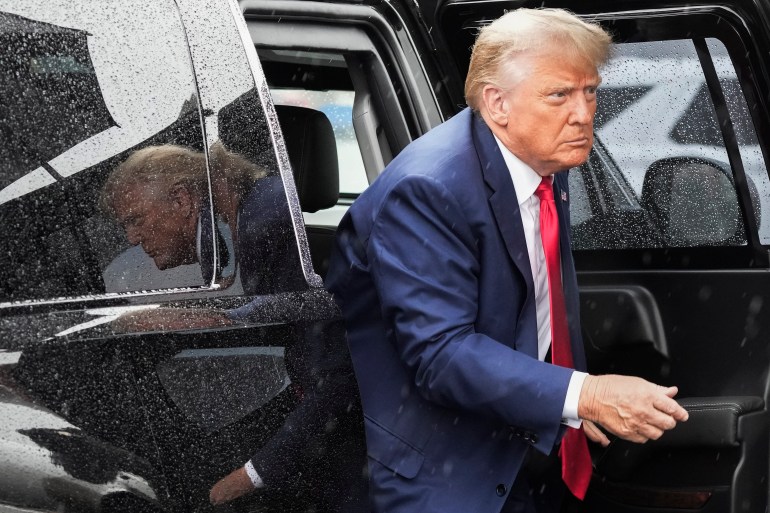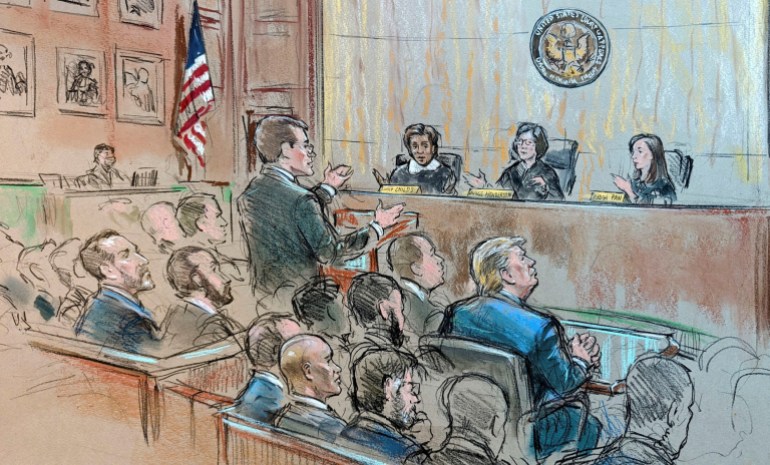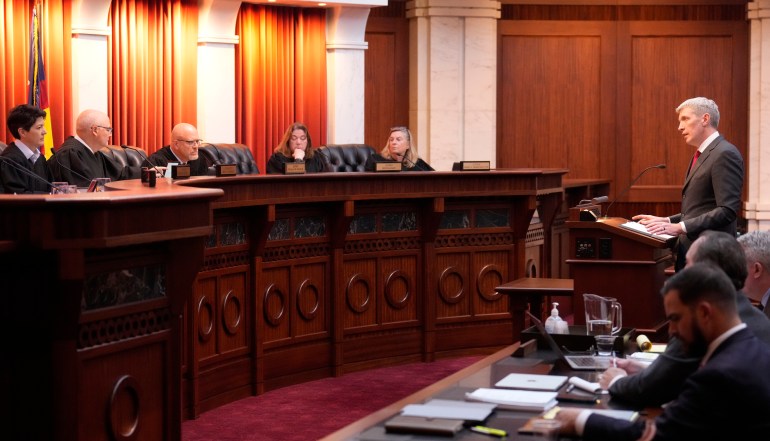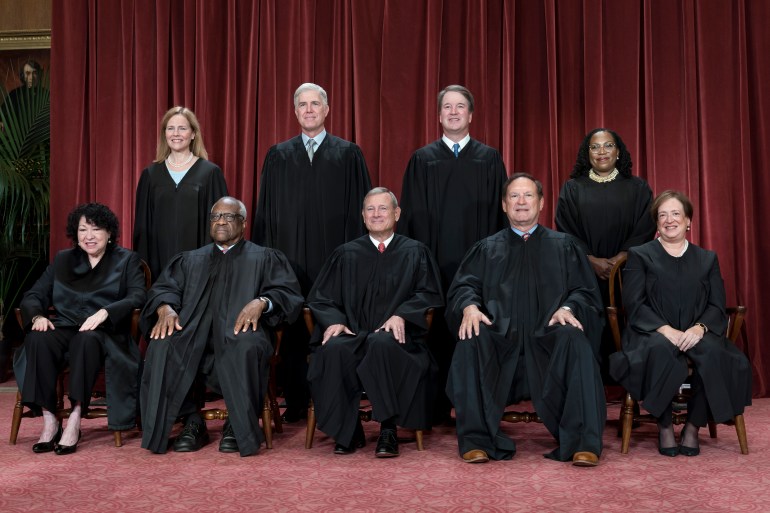Los Angeles, California – As the United States’ presidential primary season kicks off, the Supreme Court is expected to weigh in on several high-profile cases that could influence the election results.
But experts say that puts the court in a precarious position. With Republican frontrunner and former president Donald Trump embroiled in multiple legal proceedings, the court may be forced to confront the limits of its impartiality.
Some justices may even have to publicly evaluate the conduct of the former president who nominated them to the role. Trump, after all, is credited with giving the court its current conservative supermajority, after appointing three justices during his term in office.
The Trump cases will be “a test for whether or not the court can somehow put aside their political preferences and biases”, said Michael Gerhardt, a professor of jurisprudence at the University of North Carolina at Chapel Hill.

Testing the limits of presidential immunity
One of the cases likely headed to the Supreme Court has to do with Trump’s broad claims to immunity for actions he took while president.
Federal prosecutors, led by special counsel Jack Smith, have argued Trump conspired to overturn the 2020 election results during his final days in office. But Trump’s legal team has called on the court system to throw out the charges, on the premise that, as president, he was immune to criminal prosecution.
An appeals court heard arguments in the case this month. If Trump loses there, he will likely turn to the Supreme Court with another appeal.
Gerhardt said Trump’s immunity case will be a tough sell, though. “Trump’s immunity argument is incredibly weak. In fact, it’s just bad. And I have a hard time imagining that any court would agree with his argument.”
But Gerhardt added the Supreme Court may not take the case at all, leaving the federal appeal court’s decision as the last word. “They’re probably not eager to get involved at all. The immunity case probably presents a great opportunity for the court to just stay out of it.”

‘Insurrection clause’ on the docket
The Supreme Court has already been asked to intervene in another case, over whether states can remove Trump from their primary ballots.
Colorado and Maine maintain that Trump is not qualified to be on their ballots due to his actions on January 6, 2021, when his supporters stormed the US Capitol to prevent Congress from certifying 2020 election results.
Both states cited the 14th Amendment of the US Constitution, which includes a section that bars individuals from holding public office if they swear an oath of allegiance and then aid in an insurrection.
Trump had spoken to the rioters before the 2021 attack on the Capitol, repeating false claims that the election was stolen and calling on the crowd to “fight like hell”.
Experts told Al Jazeera that, of all the cases the Supreme Court may take in 2024, its decision on whether Trump can be removed from state ballots could have the greatest impact on the election.
Never before has the Supreme Court ruled on the so-called “insurrection clause”. The states’ actions also mark the first time in history that the clause has been used against a presidential candidate.
For their part, Trump’s lawyers argue it is unclear whether the law applies to the president’s office, and they have framed Trump’s remarks as falling within the limits of free speech.

A likely win for Trump
The court is scheduled to hear arguments in the case starting on February 8, ahead of the Maine and Colorado primaries on March 5. Each primary vote helps decide which candidates receive major party nominations.
Mark Graber, a law professor at the University of Maryland School of Law, said the Supreme Court justices will want to have the case wrapped up swiftly to prevent voter confusion.
“They’re likely to weigh in fairly quickly, in the sense that they’ll realise that this is something that ought not to be left hanging,” Graber said of the justices.
“So far, he [Trump] has not been kicked off any ballot where there is a primary that looks immediate.” The primary season is set to start on January 23 with a vote in New Hampshire.
Barbara Perry, professor of presidential studies at the University of Virginia, expects the conservative-stacked Supreme Court to ultimately decide in Trump’s favour.
“I think it’s highly likely that they will,” she told Al Jazeera. “Typically, political scientists have found across the board that justices tend to follow the ideology of their appointing president 70 to 80 percent of the time.”
Graber called the case “very challenging” for the court’s justices, particularly given their political leanings.
“It’s going to be very hard to avoid the appearance of bias, given the nature of the case,” he explained. “Like abortion, everyone believes their position is the neutral position, and anyone who decides differently is obviously biased.”

Bias on the bench
The question of judicial bias is a growing concern for the Supreme Court. Historically, the high court has been framed as a body that stands above politics, answerable only to the law.
But that image has been shaken, as the court finds itself facing credibility questions.
Public opinion of the Supreme Court recently dropped to a historic low. In 2023, the Pew Research Center found that only 44 percent of Americans perceived the court favourably — marking the first time since 1987 that the majority of Americans expressed disapproval.
Perry credited low approval ratings to ethical lapses and controversial decisions on abortion and affirmative action in higher education.
One of the justices at the centre of the court’s recent scandals is Clarence Thomas, a conservative judge who has faced calls to recuse himself from cases related to Trump.
Media reports in the US have indicated that his wife, activist Ginni Thomas, urged officials to reject the 2020 election results, which showed Trump losing to Democrat Joe Biden. Those reports also suggest Thomas could financially benefit if Trump is re-elected.
But experts like Perry doubt Thomas will step aside if faced with a pivotal election case.
“He typically doesn’t recuse himself,” said Perry, pointing out that the responsibility lies largely with the justices to police their own ethics. “Justices get to make that decision.”

Searching for unity at the court
The stakes are high for the high court, however. Perceptions of bias during a tightly fought election year could further erode public confidence in the justices, whose rulings shape how the law is interpreted.
“That’s when the court is most in danger — when it is viewed as being partisan, and it is down in the muck and the mire of everyday politics,” Perry said.
The experts who spoke to Al Jazeera indicated that Chief Justice John Roberts will likely seek a unanimous opinion from all nine justices in this year’s high-profile election cases, to avoid the public backlash.
“A unanimous opinion would indicate, ‘Gee, this is not politics. Everybody agrees with it.’ Whereas the more you get an opinion that breaks down along political lines, the more people are likely to think it’s just politics,” Graber said.
Perry agreed: “The worst for the court would be if it decides six to three for Trump … That is when it will be viewed as most partisan.”
The last time the Supreme Court played such a significant role in a presidential election was in 2000, when it ruled to stop a vote recount in Florida, effectively naming George W Bush the race’s winner.
While it is not unheard of to see the highest court weigh in on an election, Graber said 2024 nevertheless signals a turning point in US history.
“We are in a moment where a great many places thought to be established democracies are under threat. And many people think Donald Trump is a menace to democracy,” he said.
He also indicated that the high court’s decisions have already influenced the upcoming election. “They’ve weakened the Voting Rights Act, they have allowed gerrymandering — so there are lots of ways in which I think they have weakened democracy in the United States.”
But Gerhardt, the University of North Carolina at Chapel Hill professor, predicted that no branch of the federal government would escape scrutiny this election year.
“Every institution is going to be challenged — the Supreme Court, Congress, obviously the presidency,” he said. “And so I think we have to buckle in and expect it’s going to be a bumpy road.”
Read More: World News | Entertainment News | Celeb News
Aljazera








